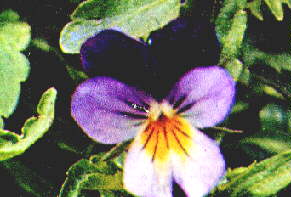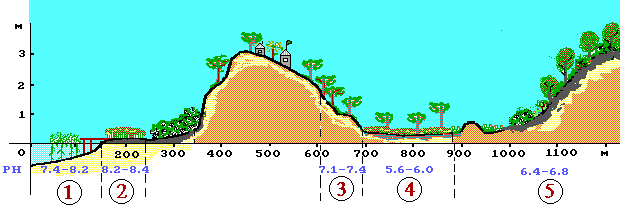

|
Ecological session
|
Co-ordinator of the educational program - L.A.Gajdar, reseacher of PSI
E-mail address: gajdar@teco.botic.ru
THE PARTICIPANTS OF THE SESSION
It was specialized environmental session for children from 10 to 16 years
old interested in nature research and conservation.
From 10th to 23rd July 1994 about 150 children took part in the session.
The participants of the Camp were children from Russia (Moscow, Yaroslavl,
Uglich, Tutayev, Rybinsk, Stavropol region, Gavrilov Yam, Norilsk, Rostov,
Zelenograd, St.Petersberg, Pereslavl-Zalessky), Ukraine (Kharkov) and Germany
(Berlin).
Every student of the ecological session had a course of environmental
education. Students choose departments by their interests. The majority of
the students studied the program of one department, 2-3% of students studied
programs of all departments. 12% of students constantly attended two
departments.
The staff of the Camp mostly consisted employees of the Program Systems
Institute of the RAS and employees of the Pereslavl National Park and
Yaroslavl State Pedagogical University faculties. There were 24 teachers
and assistants.
THE EDUCATIONAL PROGRAM
The content of the educational program was defined by:
DEPARTMENTS AND PROJECTS
The ecological session had the traditional department system. Each
department worked according to it's own program and schedule. The educational
program of the session was defined by activity of the following departments:
Besides, the educational program supported by:
JOINT PROJECT OF THE DEPARTMENTS
The project was named "Ecological Profile of the
"Urochishche Kukhmar".
There was made a description of ecological profile of the nature monument as
a result of the session work. Investigations of the profile were carried out
in 5 places, which are typical for different types of ecosystems.
OF "BOTANY AND ECOLOGY OF PLANTS" and "WATER IN OUR LIFE"

The aim of the project was not only mastering a skill of field research and collecting information of zootsenoz, fitotsenoz, condition of living organismes in every place of the profile and human influence on environment but also storage of the collected information in data base and presentation of the knowledge, received by students using information technologies.
When realizing the project climate parameters were estimated for investigating of species life conditions. Besides, investigations of the environment using bioindicators (some species of animals and plants) took place. There were some investigations concerning the influence of human factor on the biot and habitat (visual estimate of topsoil compression, atmosphere pollution through investigations of lichens, exposure of species, inserted by people (sinatropos), species composition of plants and presence of plants-polluters (for instance, in the Plescheevo Lake there is aquatic plant - vosheria).
Moreover there were chemical investigations, for example, investigations of nitrate presence in different plants, water samples from the Plescheevo Lake, the Trubezh river, the Ryabzovka river.
The following information systems were created as a result of the project:
LANDSCAPE ECOLOGY DEPARTMENT
Research of ecological characteristics of the landscape of the Camp which
is situated on the territory of National Park were carried out in this
Department. Relief and geologic structure of the Lake's hollow; depth of the
coast part of the Lake and it's overgrowing as an indicator of the ecological
situation; nature features of top soil, basical biogeotsenoz of the camp
environment (meadows, marshes, pine woods etc.), recreation loading on
acostal strip and character of degradation of the north coast cover were
investigated.
Students prepared:
REGION HISTORY DEPARTMENT
The Region History Department acqainted students with historical and
natural resources of the Pereslavl land, with it's legends, using lections,
excursions, slideshows, creation of computer movies, ecological games, etc.
During the session computer movies on legends about the Blue Stone was
realized. One of the interesting directions of the department work was ecology
instruction by a game form. Every game created a situation and helped
students to adopt experience in nature cycles and process realizing.
The following game took place:
DEPARTMENT OF RUSSIAN - JAPANESE
TELECOMMUNICATION
The aim of the project "Rainbow bridge in summer" was to stimulate
compound ecology-oriented correspondence of Russian and Japanese students,
using possibilities of telecommunication technologies. 14 students from
Shimizu Junior/High Christian school and 43 of the Simonoseki Chofu
Junior/High School participated in the project from Japanese side. These
schools are users of APICNET - Japanese educational network. This network
unites hundreds of Japanese secondary and high schools, research institutes
and business companies. 18 students of the ICCC, came to the Camp from
Pereslasvl-Zalessky, Norilsk, Tutaev, Yaroslavl and Zvezdny City took part
in this project from Russian side.
The project consisted of several programs in which the following results were achieved:
Among problems which were concerned by Russian participants of the project were problems of Pereslavl region and urgent problems of regions from which students were. They were:
The result of the program should be electronic books, design of which to be finished by Japanese side.
"COMPUTER AND ECOLOGICAL EDUCATION"
DEPARTMENT
Telecommunication ecological project for 6-8 years old children met
children with possibilities of communication through e-mail. During the session
there was an exchange of letters and drawings with English children from
Berkhamsted. After the first acquaintance Russian participants of the project
suggested the following subjects for correspondence:
In answer they received messages about pets, "Living corner" in an English school and about the Grand Union Canal - the place for walking where Englishmen have a possibility to communicate with a wild nature. In addition to information exchange and linguistic practice (translations were made by senior students ), the project gave children a possibility of friendly communication with children of the same age. The sponsors from the English side were: S&S Iternational PLC Dr. Alan Solomon; from Russian side: Russian telecommunication center of the IPS of the RAS, the head - Shamarin A.F.
"The Table printing-works" project, the biggest one, had an aim to publish a book with region legends of the Pereslavl land using computer technologies. Students mustered text and graphics editors, with the publishing Page Maker system, scanner and printer. Text composition, correcting, illustrating, decorative editing, partial making -up, and printing were made by students also. The final variant of the book - "Pereslavl region legends" was passed to the National Park.
With means of the programming language Logo the mechanism of protozoa hemotaxis was discribed in the course of project "Protozoa hemotaxis". The protozoa hemotaxis: an unicellular, provided with a plait, moved for a time only one direction. Then, if it has found a food, it choose a new direction and movement is renewed till a next occasional choice of a direction and so on. If a food is found, the protozoa does not change the direction of it's moving, as if it temporarily keeps the direction, in which searches of food were successful. Thus, the protozoa moving depends on a food gradient, i.e. where there is the bigger quantity of food. It is planned to use this model for support an appropriate theme of the school biology course.
INFORMATION CENTER
In the information center, which served all the departments of the Camp,
students were introduced to contemporary publishing systems under the
Windows and MC-DOS. Students created computer fonts, which were utilized for
printing a lot of advertisments and class schedules during the session. One
of the fragments of the computer font encyclopaedia was prepared as a result.
Besides, a group of younger students, which worked at the Information Center, prepared a handbook for the ecological game EcoQuest-I.
"ECOLOGY AND CULTURE" DEPARTMENT
Not only students studied at this department. In evenings the department
became an evening club for the teacher.
The aim of these classes was:
During art classes students studied how to create colour gamuts, mix paints, and find new colours and shadows, mastered methods of work with "beresta", technique of painting over silk, crupled paper, "spraying" and other.
Different children exhibitions took place constantly. During the session the campers were acquainted with drawing exhibition, organized by participants of international communication project for exchange of drawings on terms of global ecological problems.
This project was organized with initiative of teachers Tadao Kawasaki (Japan ) and Sheldon Smith (USA) in 1992. In November 1993 - March 1994 students from 30 towns of USA, Canada, Peru, Argentina and Russia took part in it. Discussing the project, choosing themes for studying, compiling class schedule, and discussing different organizing questions with participants of the project was made through computer net. Students drawing were sent by mail. In towns-participants of the project International drawing exhibitions were organized. Children's pictures reflected their opinion about present ecological problems. Such an exhibition was organized in Pereslavl-Zalessky, and was demonstrated during ICCC session. The project sponsors: the IPS of the RAS, the Pereslavl National Park and former Institute of Soviet-American relations (ISAR).
RUSSIAN ART DEPARTMENT
Educational program of Russian Art Department had lections with slideshow
of paintings of Tretyakovskaya Gallery. Students had a possibility to meet
ancient monuments of Russian culture, Russian landscapes and a historical
theme in Russian painters masterpieces.
Meeting with the cultural heritage was one of directions of the program of the session and a part of the common program of ecological education.
INTERDEPARTMENT PROJECTS
The curriculum let organize different interdepartment projects and games,
in which students of different departments could take part. One of them was
project of reveal of understanding and attitude of students to different
worldwide ecological problems ("ozone depletion", "global warmig", population
problem and etc.)
A teacher of ecology from Japan, Hironao Nakamura asked students of ecological session of the ICCC to answer questions of his questionnaire. It should be done at the very beginning of the session because the aim of this questionnaire was to show up understanding of ecological problems on the stage preceeding to more detail studying of these problems.
Thus, this questionnaire contains the very interesting material for teachers - view of students on global ecological problems Analogous materials of Japanese students were sent to Russia. After proccessing and analysis of questionnaires there was a network discussion of the project results.
The special feature of the session - a lot of excursions and tours of investigator groups in Pereslavl National Park. Students met the Director and collaborataives of the National Park discussed regional ecological problems and subjects of research works, which they carried out with their teachers at the Camp. Students played a game "Our National Park" and watched slideshow about the Pereslavl land. Different games with ecological aspects for all participants of the Camp, such as "Water rotation in nature", "Ecological party" took place often in extra-educational time and gathered lots of participants. In addition to the curriculum a sport and entertainment programs were done for students.
The department structure of the Camp provided teaching and students research of the environment in the different fields creating the complete picture of exploring objects. Besides, computers and possibility of telecommunication using in curriculum gave an opportunity to process quickly and analyze results, and also take part in telecommunication projects.